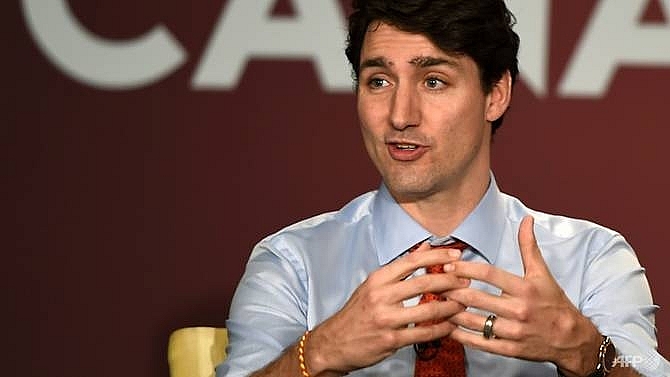Canada's Trudeau accuses China of 'dumping' steel on global markets
 |
| Prime Minister Justin Trudeau said Canada already has "significant barriers" to prevent low-cost steel and aluminum from being dumped in this country, and is prepared to work with Washington AFP/PUNIT PARANJPE |
"We are very concerned about the actions taken by China and the dumping of steel and aluminum on the global market," Trudeau said following a tour of an aluminium plant in Quebec.
His comments came amid rising global trade tensions in the wake of a US decision to impose steep tariffs on imported steel and aluminum.
Canada, the top supplier of steel and aluminium to the US market, and Mexico have been temporarily exempted from the tariffs until trilateral continental trade talks conclude.
Trudeau, who is expected to travel to three other Canadian steel cities to reassure workers in the coming days, said Canada already has "significant barriers" in place to prevent low-cost steel and aluminum from being dumped there, and is prepared to work with Washington to "do even more."
"There is a global overcapacity issue and we are very pleased to work with our allies and friends to continue to counter that problem," he said.
When Trump announced last week 10 per cent tariffs on aluminium and 25 per cent on steel, he said Canada and Mexico could be exempted permanently if the ongoing renegotiation of the North American Free Trade Agreement (NAFTA) is successful.
But both Mexico and Canada rejected Trump's linkage of the levies to the ongoing NAFTA talks.
Canada's Foreign Minister Chrystia Freeland termed the two things "separate issues," while Mexico's economy ministry said "the negotiation of the NAFTA should not be subject to conditions outside the process."
"We will continue working toward securing a definite and permanent exemption from those tariffs," Trudeau said.
China is Canada's second-largest trading partner after the United States.
Trudeau's dumping accusations against Beijing, which echoed Trump's own message, come after exploratory talks with China failed to advance to Canada-China free trade negotiations.
Instead, Ottawa signed onto the 11-nation Trans Pacific Partnership (TPP), which excludes both China and the United States, and entered into talks last week to join a South American trading bloc as part of a concerted push to diversify its trading relationships.
A Canada-EU free trade accord, meanwhile, entered into force last September.
What the stars mean:
★ Poor ★ ★ Promising ★★★ Good ★★★★ Very good ★★★★★ Exceptional
 Tag:
Tag:
Related Contents
Latest News
More News
- Foreign leaders extend congratulations to Party General Secretary To Lam (January 25, 2026 | 10:01)
- Russian President congratulates Vietnamese Party leader during phone talks (January 25, 2026 | 09:58)
- Worldwide congratulations underscore confidence in Vietnam’s 14th Party Congress (January 23, 2026 | 09:02)
- Political parties, organisations, int’l friends send congratulations to 14th National Party Congress (January 22, 2026 | 09:33)
- 14th National Party Congress: Japanese media highlight Vietnam’s growth targets (January 21, 2026 | 09:46)
- 14th National Party Congress: Driving force for Vietnam to continue renewal, innovation, breakthroughs (January 21, 2026 | 09:42)
- Vietnam remains spiritual support for progressive forces: Colombian party leader (January 21, 2026 | 08:00)
- Int'l media provides large coverage of 14th National Party Congress's first working day (January 20, 2026 | 09:09)
- Vietnamese firms win top honours at ASEAN Digital Awards (January 16, 2026 | 16:45)
- ASEAN Digital Ministers' Meeting opens in Hanoi (January 15, 2026 | 15:33)




























 Mobile Version
Mobile Version